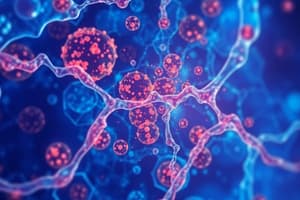Podcast
Questions and Answers
What are cells that don't have the ability to multiply?
What are cells that don't have the ability to multiply?
- Stable cells
- Labile cells
- Transitional cells
- Permanent cells (correct)
Stable cells cannot enter the cell cycle.
Stable cells cannot enter the cell cycle.
False (B)
What is an example of permanent cells?
What is an example of permanent cells?
Neurons, striated skeletal or cardiac muscle cells
What can permanent cells only do?
What can permanent cells only do?
What type of cells only multiply when receiving an external stimulus?
What type of cells only multiply when receiving an external stimulus?
Stable cells are usually in the G0 resting phase.
Stable cells are usually in the G0 resting phase.
Stable cells can divide and give rise to different cell types.
Stable cells can divide and give rise to different cell types.
What must happen for stable cells to enter the G1 phase?
What must happen for stable cells to enter the G1 phase?
List examples of stable cells.
List examples of stable cells.
What type of cells can undergo hypertrophy and/or hyperplasia?
What type of cells can undergo hypertrophy and/or hyperplasia?
What type of cells multiply constantly throughout life?
What type of cells multiply constantly throughout life?
Which type of cells is most affected by chemotherapy that inhibits M and S phases?
Which type of cells is most affected by chemotherapy that inhibits M and S phases?
What do labile cells contain?
What do labile cells contain?
List examples of labile cells.
List examples of labile cells.
Why are labile cells affected by radiation and S phase chemotherapy drugs?
Why are labile cells affected by radiation and S phase chemotherapy drugs?
Flashcards are hidden until you start studying
Study Notes
Permanent Cells
- Defined as cells that don't have the ability to multiply.
- Cannot enter the cell cycle and are permanently differentiated.
- Key examples include neurons and striated skeletal or cardiac muscle cells.
- Permanent cells can only undergo hypertrophy (increase in cell size) or atrophy (decrease in cell size).
Stable Cells
- These cells multiply only when stimulated by external factors.
- Usually found in the G0 resting phase of the cell cycle.
- Can divide, producing daughter cells of the same lineage.
- Require stimulation by hormones and growth factors to transition into the G1 phase.
- Examples include progenitor blood cells, skin cells, liver cells, and smooth muscle.
- Capable of undergoing hypertrophy and/or hyperplasia (increase in the number of cells).
Labile Cells
- Characterized by constant multiplication throughout life.
- Most affected by chemotherapy targeting M (mitosis) and S (synthesis) phases due to their high mitotic activity.
- Contain stem cells, which are essential for regeneration and repair.
- Examples include bone marrow stem cells, skin cells, and intestinal cells.
- Vulnerable to damage from radiation and S-phase chemotherapy drugs due to their rapid division rates.
Studying That Suits You
Use AI to generate personalized quizzes and flashcards to suit your learning preferences.




